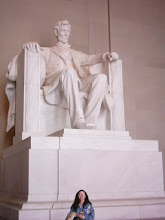Thursday, August 21, 2008
Stephanie Tubbs Jones
Who was she?
A rebel. A woman who believed she could "cure the ills of society".
Stephanie Tubbs was born September 10, 1949 in Cleveland, Ohio. Her dad was Andrew Tubbs worked as a skycab for United Airlines and her mother, Mary, was a homemaker until Stephanie started kindergarten.
She was a gifted student through high school and was offered a full scholarship to attend Case Western Reserve University (CWRU) in Cleveland.
A sociology major with a minor in psychology, Tubbs Jones believed that she was going to "cure the ills of society" upon graduation, as she told CBB. However, her focus altered greatly after she enrolled in a course in the Black Studies Program during her senior year. Entitled "Law As It Relates to the Black Community," the class was taught by the late Judge Charles W. Fleming, who at the time was a prominent trial lawyer and defense attorney. Through Fleming Tubbs Jones not only met people of color who were practicing law, but she was also encouraged to apply to law school herself. Thus, in 1971 Tubbs Jones entered Case Western Reserve University School of Law on another scholarship. At that time very few women, let alone women of color, attended law school
Throughout law school, Tubbs Jones worked as a law clerk for the Northeast Ohio Regional Sewer District and remained with the district as the assistant general counsel and equal opportunity administrator following her graduation in 1974. However, she yearned to try courtroom cases and after applying three times was hired to work as an assistant prosecutor in the Cuyahoga County Prosecutor's Office in Cleveland in 1976. From 1979 until 1981 she continued her time in the courtroom as a trial attorney with the Equal Employment Opportunity Commission in Cleveland, trying a wide variety of discrimination cases.
In November of 1981, at the age of 31, Tubbs Jones was elected with 33 percent of the vote among a field of five candidates, and she has been in elected life ever since.
After only 15 months, then-Ohio Governor Richard Celeste appointed Tubbs Jones to the Court of Common Pleas, making her the first African American female to serve on the Court of Common Pleas in the state of Ohio. After winning election to the bench in 1984 and again in 1988, Tubbs Jones was asked by the Democratic Party in July of 1990 to replace Judge Mary Cacioppo on the ballot for the Ohio Supreme Court who had been forced to withdraw due to health problems. Despite the short lead time and despite running against Republican incumbent Justice J. Craig Wright, who had twice as much funding as she herself commanded, she almost won the November statewide election, losing by only three percentage points.
In 1990 John Corrigan, the Cuyahoga County prosecutor for the previous 34 years, retired, and Tubbs Jones was drafted by a cross-section of the party to run for his position. Following a ten-day campaign Tubbs Jones won the party election by 31 votes to become not only the first female prosecutor in Cuyahoga County but also the first African American prosecutor in the state of Ohio and the only African American female prosecutor in a major metropolitan area in the United States. But, as she told Mihaly, "I don't glory in being first ... I hope I don't see myself being last." Capitalizing on her success, she won the general election in 1992 with a resounding 70 percent of the vote and was reelected again in 1996. Jones had truly proven to be a masterful politician.
After seven years in office, Tubbs Jones decided to build upon her previous electoral success and enter the national political scene. When Louis Stokes, the only African American congressperson in the state of Ohio, decided not to seek reelection in 1998, Tubbs Jones mounted a campaign for his seat. As might be expected, her platform focused on those key issues which had always consumed her: the protection of children and the improvement of education for all; safe, affordable child care; the safety of neighborhoods; the extension of affirmative action for minorities and women; and the protection of social security and health care for seniors and families. After gaining 51 percent of the vote among a field of five candidates in the primaries, she dominated the slate in the general election: with 52.1 percent of her support coming from business and 33.5 percent from labor, she won 79 percent of the vote to become the next United States congressperson from Ohio's 11th District.
While in office Tubbs Jones has sought to address the issues which she raised during her campaign. Given the broad socio-economic diversity of the district which she represents, she has focused on economic development and a strong educational system, issues which connect and are powerfully relevant to her entire constituency. Towards this end, Tubbs Jones has energetically worked as a member of the banking and small business Congressional committees.
She was one of Hillary Clinton's most ardent supporters as she ran for the Democratic candidate. Because of this she was given much grief from her fellow memebers of the Congressional Black Caucus. This did not phrase her, she had faced adversity before and believed she would again.
Stephanie, you will be missed.
A champion for women's rights, human rights.
Stephanie was not but
here I am "STUCK IN THE MIDDLE WITH YOU".
Subscribe to:
Post Comments (Atom)





No comments:
Post a Comment